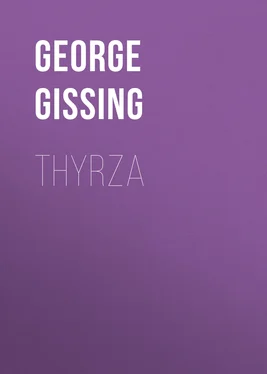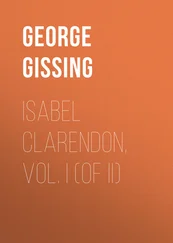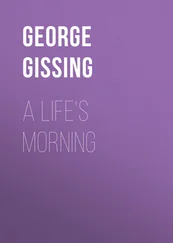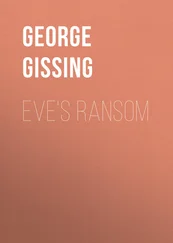George Gissing - Thyrza
Здесь есть возможность читать онлайн «George Gissing - Thyrza» — ознакомительный отрывок электронной книги совершенно бесплатно, а после прочтения отрывка купить полную версию. В некоторых случаях можно слушать аудио, скачать через торрент в формате fb2 и присутствует краткое содержание. Жанр: foreign_prose, literature_19, foreign_antique, на английском языке. Описание произведения, (предисловие) а так же отзывы посетителей доступны на портале библиотеки ЛибКат.
- Название:Thyrza
- Автор:
- Жанр:
- Год:неизвестен
- ISBN:нет данных
- Рейтинг книги:3 / 5. Голосов: 1
-
Избранное:Добавить в избранное
- Отзывы:
-
Ваша оценка:
- 60
- 1
- 2
- 3
- 4
- 5
Thyrza: краткое содержание, описание и аннотация
Предлагаем к чтению аннотацию, описание, краткое содержание или предисловие (зависит от того, что написал сам автор книги «Thyrza»). Если вы не нашли необходимую информацию о книге — напишите в комментариях, мы постараемся отыскать её.
Thyrza — читать онлайн ознакомительный отрывок
Ниже представлен текст книги, разбитый по страницам. Система сохранения места последней прочитанной страницы, позволяет с удобством читать онлайн бесплатно книгу «Thyrza», без необходимости каждый раз заново искать на чём Вы остановились. Поставьте закладку, и сможете в любой момент перейти на страницу, на которой закончили чтение.
Интервал:
Закладка:
And the lectures? It is not too much to say that they were good. Egremont had capacity for teaching; with his education, had he been without resources, he would probably have chosen an academic career, and have done service in it. There was nothing deep in his style of narrative and criticism, and here depth was not wanted; sufficient that he was perspicuous and energetic. He loved the things of which he spoke, and he had the power of presenting to others his reason for loving them. Not one in five hundred men inexperienced in such work could have held the ears of the class as he did for the first two or three evenings. It was impossible for them to mistake his spirit—ardent, disinterested, aspiring—impossible not to feel something of a respondent impulse. That familiarity should diminish the effect of his speech was only to be anticipated. He was preaching a religion, but one that could find no acceptance as such with eight out of nine who heard him. Common minds are not kept at high-interest mark for long together by exhibition of the merely beautiful, however persuasively it be set forth.
He had chosen the Elizabethan period, and he led up to it by the kind of introduction which he felt would be necessary. Trusting himself more after the first fortnight, he ceased to write out his lectures verbatim; free utterance was an advantage to himself and his audience. He read at large from his authors; to expect the men to do this for themselves—even had the books been within their reach—would have been too much, and without such illustration the lectures were vain. This reading brought him face to face with his main difficulty: how to create in men a sense which they do not possess. The working man does not read, in the strict sense of the word; fiction has little interest for him, and of poetry he has no comprehension whatever; your artisan of brains can study, but he cannot read. Egremont was under no illusion on this point; he knew well that the loveliest lyric would appeal to a man like Bower no more than an unintelligible demonstration of science. Was it impossible to bestow this sense of intellectual beauty? With what earnestness he made the endeavour! He took sweet passages of prose and verse, and read them with all the feeling and skill he could command. 'Do you yield to that?' he said within himself as he looked from face to face. 'Are your ears hopelessly sealed, your minds immutably earthen?' Grail—Oh yes, Grail had the right intelligence in his eyes; but Ackroyd, but Bunce? Ackroyd thought of the meaning of the words; no more. Poor Bunce had darkling throes of mind, but struggled with desperate nervousness and could not be at ease till the straightforward talk began again. And Bower?—Nay, there goes more to this matter than mere enthusiasm in a teacher. Who had instructed Gilbert Grail to discern the grace of the written word? On the other hand, it was doubtful whether Walter Egremont, left to himself in the home of his good plain father, would have felt what now he did. The soil was there, but how much do we not owe to tillage. Read what Egremont on one occasion read to these men:
'"He beginneth not with obscure definitions, which must blur the margins with interpretations and load the memory with doubtfulness: but he cometh to you with words set in delightful proportion, either accompanied with or prepared for the well-enchanting skill of music and with a tale forsooth he cometh unto you—with a tale which holdeth children from play, and old men from the chimney-corner."'
What were that to you, save for the glow of memory fed with incense of the poets?—save for innumerable dear associations, only possible to the instructed, which make the finer part of your intellectual being? Walter was attempting too much, and soon became painfully conscious of it.
He came to the dramatists, and human interest thenceforth helped him. He could read well, and a scene from those giants of the prime had efficiency even with Bower. Hope revived in the lecturer.
To-night he was less happy than usual, for what reason he could not himself understand. His thoughts wandered, sometimes to Eastbourne, sometimes to Ullswater; yet he was speaking of Shakespeare. Bower was more owl-eyed than usual; the five doubtful hearers obviously felt the time long. Only Grail gave an unfailing ear. Egremont closed with a sense of depression.
Would Bower come and pester him with fatuous questions and remarks? No; Bower turned away and reached his hat from the peg. The doubtful five took down their hats and followed the portly man from the room. Bunce was talking with Grail, pointing with dirty forefinger to something in his dirty note-book. But he, too, speedily moved to the hat-pegs. Grail was also going, when Egremont said:
'Could you spare me five minutes, Mr. Grail; I should like to speak to you.'
CHAPTER VIII
A CLASP OF HANDS
Grail approached the desk with pleasure. Egremont observed it, and met his trusty auditor with the eye-smile which made his face so agreeable.
'I am sorry to see that Mr. Ackroyd no longer sits by you,' he began. 'Has he deserted us?'
Gilbert hesitated, but spoke at length with his natural directness.
'I'm afraid so, sir.'
'He has lost his interest in the subject?'
'It's not exactly the bent of his mind. He only came at my persuasion to begin with. He takes more to science than literature.'
'Ah, I should have thought that. But I wish he could have still spared me the two hours a week. I felt much interest in him; it's a disappointment to lose him so unexpectedly. I'm sure he has a head for our matters as well as for science.'
Grail was about to speak, but checked himself. An inquiring glance persuaded him to say:
'He's much taken up with politics just now. They don't leave the mind very quiet.'
'Politics? I regret more than ever that he's gone.'
Egremont moved away from the desk at which he had been standing, and seated himself on the end of a bench which came out opposite the fire-place.
'Come and sit down for a minute, will you, Mr. Grail?' he said.
Gilbert silently took possession of the end of the next bench.
'Is there no persuading him back? Do you think he would come and have a talk with me? I do wish he would; I believe we could understand each other. You see him occasionally?'
'Every day. We work together.'
'Would you ask him to come and have a chat with me here some evening?'
'I shall be glad to, sir.'
'Pray persuade him to. Any evening he likes. Perhaps next Sunday after the lecture would do? Tell him to bring his pipe and have a smoke with me here before the fire.'
Grail smiled, and undertook to deliver the invitation.
'But there are other things I wished to speak of to you,' Egremont continued. 'Do you think it would be any advantage if I brought books for the members of the class to take away and use at their leisure? Shakespeare, of course, you can all lay hands on, but the other Elizabethan authors are not so readily found. For instance, there's a Marlowe on the desk; would you care to take him away with you?'
'Thank you very much, sir,' was the reply, 'but I've got Marlowe. I picked up a second-hand copy a year or two ago.'
'You have him! Ah, that's good!'
Egremont was surprised, but remembered that it would not be very courteous to express such feeling. After surprise came new warmth of interest in the man. He began to speak of Marlowe with delight, and in a moment he and Grail were on a footing of intimacy.
'But there are other books perhaps you haven't come across yet. I shall be overjoyed if you'll let me be of use to you in that way. Have you access to any library?'
'No, I haven't. I've often felt the want of it.'
Egremont fell into musing for a moment. He looked up with an idea in his eyes.
Читать дальшеИнтервал:
Закладка:
Похожие книги на «Thyrza»
Представляем Вашему вниманию похожие книги на «Thyrza» списком для выбора. Мы отобрали схожую по названию и смыслу литературу в надежде предоставить читателям больше вариантов отыскать новые, интересные, ещё непрочитанные произведения.
Обсуждение, отзывы о книге «Thyrza» и просто собственные мнения читателей. Оставьте ваши комментарии, напишите, что Вы думаете о произведении, его смысле или главных героях. Укажите что конкретно понравилось, а что нет, и почему Вы так считаете.












